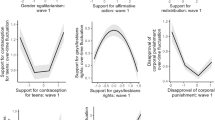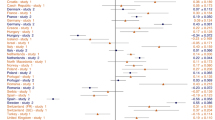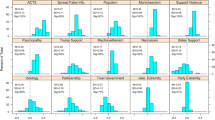Abstract
We examine judgements of bias in distributional outcomes. Such judgements are often based on imbalance in distributional outcomes, namely, the under- or over-representation of a target group relative to some baseline. Using data from 26 studies (N = 14,925), we test how these judgements of bias vary with the target group’s characteristics (traditionally dominant or non-dominant) and the observer’s political ideology (liberal or conservative). We find that conservatives set a higher threshold for recognizing bias against traditionally non-dominant targets (women, Black people, immigrants), as compared with liberals. Conversely, liberals set a higher threshold for recognizing bias against traditionally dominant targets (men, white people, native-born citizens), as compared with conservatives. However, these relationships between political ideology and judgements of bias diminish when the targets are unknown or ideologically irrelevant. These findings emphasize the context-dependency of bias judgements and underscore the importance of stimulus sampling and appropriate selection of controls.
This is a preview of subscription content, access via your institution
Access options
Access Nature and 54 other Nature Portfolio journals
Get Nature+, our best-value online-access subscription
$29.99 / 30 days
cancel any time
Subscribe to this journal
Receive 12 digital issues and online access to articles
$119.00 per year
only $9.92 per issue
Buy this article
- Purchase on Springer Link
- Instant access to full article PDF
Prices may be subject to local taxes which are calculated during checkout






Similar content being viewed by others
Data availability
The datasets analysed in this research can be accessed on the project’s Open Science Framework page84 at https://osf.io/sa35x/.
Code availability
The code for reproducing the analyses in this research can be accessed on the project’s Open Science Framework page84 at https://osf.io/sa35x/.
References
Douthat, R. Google’s war over the sexes. The New York Times (9 August 2017).
Belkin, D. Harvard accused of bias against Asian-Americans. The Wall Street Journal (15 May 2015).
Belson, K. & Vrentas, J. Brian Flores sues N.F.L., claiming bias in coaching search. The New York Times (1 February 2022).
Walster, E. Assignment of responsibility for an accident. J. Pers. Soc. Psychol. 3, 73–79 (1966).
Baron, J. & Hershey, J. C. Outcome bias in decision evaluation. J. Pers. Soc. Psychol. 54, 569–579 (1988).
Lipshitz, R. ‘Either a medal or a corporal’: the effects of success and failure on the evaluation of decision making and decision makers. Organ. Behav. Hum. Decis. Process. 44, 380–395 (1989).
Ditto, P. H. & Lopez, D. F. Motivated skepticism: use of differential decision criteria for preferred and nonpreferred conclusions. J. Pers. Soc. Psychol. 63, 568–584 (1992).
Lord, C. G., Ross, L. & Lepper, M. R. Biased assimilation and attitude polarization: the effects of prior theories on subsequently considered evidence. J. Pers. Soc. Psychol. 37, 2098–2109 (1979).
Vallone, R. P., Ross, L. & Lepper, M. R. The hostile media phenomenon: biased perception and perceptions of media bias in coverage of the Beirut massacre. J. Pers. Soc. Psychol. 49, 577–585 (1985).
Kressel, N. J. Biased judgments of media bias: a case study of the Arab–Israeli dispute. Polit. Psychol. 8, 211–227 (1987).
Hastorf, A. H. & Cantril, H. They saw a game; a case study. J. Abnorm. Soc. Psychol. 49, 129–134 (1954).
Jost, J. T., Federico, C. M. & Napier, J. L. Political ideology: its structure, functions, and elective affinities. Annu. Rev. Psychol. 60, 307–337 (2009).
Milburn, M. A., Conrad, S. D., Sala, F. & Carberry, S. Childhood punishment, denial, and political attitudes. Polit. Psychol. 16, 447–478 (1995).
De Neve, J. E. Personality, childhood experience, and political ideology. Polit. Psychol. 36, 55–73 (2015).
Haidt, J. & Graham, J. When morality opposes justice: conservatives have moral intuitions that liberals may not recognize. Soc. Justice Res. 20, 98–116 (2007).
Conway, L. G., Chan, L. & Woodard, S. R. Socio-ecological influences on political ideology. Curr. Opin. Psychol. 32, 76–80 (2020).
Niemi, R. G. & Jennings, M. K. Issues and inheritance in the formation of party identification. Am. J. Polit. Sci. 35, 970–988 (1991).
Baron, J. & Jost, J. T. False equivalence: are liberals and conservatives in the United States equally biased? Perspect. Psychol. Sci. 14, 292–303 (2019).
Ditto, P. H. et al. At least bias is bipartisan: a meta-analytic comparison of partisan bias in liberals and conservatives. Perspect. Psychol. Sci. 14, 273–291 (2019).
Kerlinger, F. N. A social attitude scale: evidence on reliability and validity. Psychol. Rep. 26, 379–383 (1970).
Duckitt, J., Wagner, C., du Plessis, I. & Birum, I. The psychological bases of ideology and prejudice: testing a dual process model. J. Pers. Soc. Psychol. 83, 75–93 (2002).
Feldman, S. & Johnston, C. Understanding the determinants of political ideology: implications of structural complexity. Polit. Psychol. 35, 337–358 (2014).
McLellan, D. Ideology (Concepts in Social Thought) (Univ. of Minnesota Press, 1995).
Sowell, T. A Conflict of Visions: Ideological Origins of Political Struggles (Basic Books, 2002).
Haidt, J. The Righteous Mind: Why Good People are Divided by Politics and Religion (Vintage, 2012).
Graham, J., Haidt, J. & Nosek, B. A. Liberals and Conservatives rely on different sets of moral foundations. J. Pers. Soc. Psychol. 96, 1029–1046 (2009).
Ridgeway, C. L. & Correll, S. J. Unpacking the gender system a theoretical perspective on gender beliefs and social relations. Gend. Soc. 18, 510–531 (2004).
Axt, J. R., Ebersole, C. R. & Nosek, B. A. The rules of implicit evaluation by race, religion, and age. Psychol. Sci. 25, 1804–1815 (2014).
Zou, L. X. & Cheryan, S. Two axes subordination: a new model racial position. J. Pers. Soc. Psychol. 112, 696–717 (2017).
Kim, C. J. The racial triangulation of Asian Americans. Polit. Soc. 27, 105–138 (1999).
Quillian, L. Prejudice as a response to perceived group threat: population composition and anti-immigrant and racial prejudice in Europe. Am. Sociol. Rev. 60, 586–611 (1995).
Ruel, E. & Hauser, R. M. Explaining the gender wealth gap. Demography 50, 1155–1176 (2013).
Conley, D. Parental resources, inheritance, and investment dynamics. Sociol. Inq. 71, 39–66 (2001).
Berry, J. W. A psychology of immigration. J. Soc. 57, 615–631 (2001).
Knuth, D. E. The Art of Computer Programming, Volume 3: Sorting and Searching (Addison-Wesley Professional, 1998).
Spiller, S. A., Fitzsimons, G. J., Lynch, J. G. & McClelland, G. H. Spotlights, floodlights, and the magic number zero: simple effects tests in moderated regression. J. Mark. Res. 50, 277–288 (2013).
Johnson, P. O. & Neyman, J. Tests of certain linear hypotheses and their application to some educational problems. Stat. Res. Mem. 1, 57–93 (1936).
Aiken, L. S., West, S. G. & Reno, R. R. Multiple Regression: Testing and Interpreting Interactions (Sage, 1991).
Kim, J. Floodlight Analysis Tool (‘FAT’) v0.5: A Tutorial (Open Science Framework, 2022); http://floodlightanalysis.com/floodlight.pdf
Kim, J. kim: A toolkit for behavioral scientists. R package version 0.5.422 https://jinkim.science/docs/kim.pdf (2023).
Hedges, L. V. & Olkin, I. Statistical Methods for Meta-Analysis (Academic Press, 1985).
Field, A. P. Meta-analysis of correlation coefficients: a Monte Carlo comparison of fixed- and random-effects methods. Psychol. Methods 6, 161–180 (2001).
Hayes, A. F. & Montoya, A. K. A tutorial on testing, visualizing, and probing an interaction involving a multicategorical variable in linear regression analysis. Commun. Methods Meas. 11, 1–30 (2017).
Koehler, J. J. The influence of prior beliefs on scientific judgments of evidence quality. Organ. Behav. Hum. Decis. Process. 56, 28–55 (1993).
Hahn, U. & Harris, A. J. L. in Psychology of Learning and Motivation Vol. 61 (ed. Ross, B. H.) 41–102 (Elsevier, 2014).
Graham, J. et al. in Advances in Experimental Social Psychology Vol. 47 (eds Devine, P. & Plant, A.) 55–130 (Elsevier, 2013).
Kivikangas, J. M., Fernández-Castilla, B., Järvelä, S., Ravaja, N. & Lönnqvist, J.-E. Moral foundations and political orientation: systematic review and meta-analysis. Psychol. Bull. 147, 55–94 (2021).
Voelkel, J. G. & Brandt, M. J. The effect of ideological identification on the endorsement of moral values depends on the target group. Pers. Soc. Psychol. Bull. 45, 851–863 (2019).
Kugler, M., Jost, J. T. & Noorbaloochi, S. Another look at moral foundations theory: do authoritarianism and social dominance orientation explain liberal–conservative differences in ‘moral’ intuitions? Soc. Justice Res. 27, 413–431 (2014).
Federico, C. M., Weber, C. R., Ergun, D. & Hunt, C. Mapping the connections between politics and morality: the multiple sociopolitical orientations involved in moral intuition. Polit. Psychol. 34, 589–610 (2013).
Frimer, J. A. Do liberals and conservatives use different moral languages? Two replications and six extensions of Graham, Haidt, and Nosek’s (2009) moral text analysis. J. Res. Pers. 84, 103906 (2020).
Frimer, J. A., Biesanz, J. C., Walker, L. J. & MacKinlay, C. W. Liberals and conservatives rely on common moral foundations when making moral judgments about influential people. J. Pers. Soc. Psychol. 104, 1040–1059 (2013).
Waldfogel, H. B., Sheehy-Skeffington, J., Hauser, O. P., Ho, A. K. & Kteily, N. S. Ideology selectively shapes attention to inequality. Proc. Natl Acad. Sci. USA 118, e2023985118 (2021).
Chambers, J. R., Schlenker, B. R. & Collisson, B. Ideology and prejudice: the role of value conflicts. Psychol. Sci. 24, 140–149 (2013).
Brandt, M. J., Reyna, C., Chambers, J. R., Crawford, J. T. & Wetherell, G. The ideological-conflict hypothesis: intolerance among both liberals and conservatives. Curr. Dir. Psychol. Sci. 23, 27–34 (2014).
Sibley, C. G. & Duckitt, J. Personality and prejudice: a meta-analysis and theoretical review. Pers. Soc. Psychol. Rev. 12, 248–279 (2008).
Brandt, M. J. & Crawford, J. T. in Advances in Experimental Social Psychology Vol. 61 (ed. Gawronski, B.) 1–66 (Elsevier, 2020).
Crawford, J. T. & Brandt, M. J. Ideological (a)symmetries in prejudice and intergroup bias. Curr. Opin. Behav. Sci. 34, 40–45 (2020).
Crawford, J. T., Jussim, L., Cain, T. R. & Cohen, F. Right-wing authoritarianism and social dominance orientation differentially predict biased evaluations of media reports: dual-process model and media reports. J. Appl. Soc. Psychol. 43, 163–174 (2013).
Tetlock, P. E. Cognitive style and political ideology. J. Pers. Soc. Psychol. 45, 118–126 (1983).
Eidelman, S., Crandall, C. S., Goodman, J. A. & Blanchar, J. C. Low-effort thought promotes political conservatism. Pers. Soc. Psychol. Bull. 38, 808–820 (2012).
Wojcik, S. P., Hovasapian, A., Graham, J., Motyl, M. & Ditto, P. H. Conservatives report, but liberals display, greater happiness. Science 347, 1243–1246 (2015).
Uhlmann, E. L., Pizarro, D. A., Tannenbaum, D. & Ditto, P. H. The motivated use of moral principles. Judgm. Decis. Mak. 4, 479–491 (2009).
Ditto, P. H. et al. Partisan bias and its discontents. Perspect. Psychol. Sci. 14, 304–316 (2019).
Nisbet, E. C., Cooper, K. E. & Garrett, R. K. The partisan brain: how dissonant science messages lead conservatives and liberals to (dis)trust science. Ann. Am. Acad. Pol. Soc. Sci. 658, 36–66 (2015).
Strickland, B. & Suben, A. Experimenter philosophy: the problem of experimenter bias in experimental philosophy. Rev. Philos. Psychol. 3, 457–467 (2012).
Wells, G. L. & Windschitl, P. D. Stimulus sampling and social psychological experimentation. Pers. Soc. Psychol. Bull. 25, 1115–1125 (1999).
Monin, B. & Oppenheimer, D. M. The limits of direct replications and the virtues of stimulus sampling. Soc. Psychol. 45, 299–300 (2014).
Hatemi, P. K., Crabtree, C. & Smith, K. B. Ideology justifies morality: political beliefs predict moral foundations. Am. J. Polit. Sci. 63, 788–806 (2019).
R Core Team. R: A Language and Environment for Statistical Computing (R Foundation for Statistical Computing, 2022).
Wickham, H. ggplot2: Elegant Graphics for Data Analysis (Springer, 2016).
Viechtbauer, W. Conducting meta-analyses in R with the metafor package. J. Stat. Softw. https://doi.org/10.18637/jss.v036.i03 (2010).
Auguie, B. gridExtra: Miscellaneous functions for ‘grid’ graphics. R package version 2.3 https://cran.r-project.org/package=gridExtra (2017).
Dowle, M. & Srinivasan, A. data.table: Extension of ‘data.frame’. R package version 1.14.6 https://r-datatable.com (2022).
Horowitz, J., Parker, K. & Stepler, R. Wide Partisan Gaps in U.S. over How Far the Country Has Come on Gender Equality (Pew Research Center, 2017).
Horowitz, J. M., Brown, A. & Cox, K. Race in America 2019 (Pew Research Center, 2019).
Dalbert, C. The world is more just for me than generally: about the personal belief in a just world scale’s validity. Soc. Justice Res. 12, 79–98 (1999).
Krijnen, J. M. T., Ülkümen, G., Bogard, J. E. & Fox, C. R. Lay theories of financial well-being predict political and policy message preferences. J. Pers. Soc. Psychol. 122, 310–336 (2022).
Ho, A. K. et al. The nature of social dominance orientation: theorizing and measuring preferences for intergroup inequality using the new SDO7 scale. J. Pers. Soc. Psychol. 109, 1003–1028 (2015).
Pratto, F., Sidanius, J., Stallworth, L. & Malle, B. Social dominance orientation: a personality variable predicting social and political attitudes. J. Pers. Soc. Pychol. 67, 741–763 (1994).
Hong, S.-M. & Faedda, S. Refinement of the Hong psychological reactance scale. Educ. Psychol. Meas. 56, 173–182 (1996).
Brehm, J. W. A Theory of Psychological Reactance (Academic Press, 1966).
Luhtanen, R. & Crocker, J. A collective self-esteem scale: self-evaluation of one’s social identity. Pers. Soc. Psychol. Bull. 18, 302–318 (1992).
Kim, J. & Zauberman, G. Bias and ideology. Open Science Framework https://doi.org/10.17605/OSF.IO/SA35X (2023).
Acknowledgements
We thank R. Hauser for significant contributions during the early stages of this research project; C. Cusimano, B. K. Teeselink, S. Frederick, J. Dana, J. Kim, J. Wong and seminar participants at Yale University, the University of Chicago and Data Colada for insightful comments. The Yale School of Management and its Behavioral Lab provided funds to G.Z. for this research. The funders had no role in study design, data collection and analysis, decision to publish or preparation of the manuscript.
Author information
Authors and Affiliations
Contributions
G.Z. conceived the research question. G.Z. and J.K. developed the study designs. J.K. collected and analysed the data under the supervision of G.Z. J.K. wrote the initial draft, and G.Z. and J. K. wrote and edited the subsequent drafts. J.K. and G.Z. approved the final manuscript.
Corresponding authors
Ethics declarations
Competing interests
The authors declare no competing interests.
Peer review
Peer review information
Nature Human Behaviour thanks David Caicedo, Jarret Crawford, Amanda Kay Montoya and Cristian Rodriguez for their contribution to the peer review of this work.
Additional information
Publisher’s note Springer Nature remains neutral with regard to jurisdictional claims in published maps and institutional affiliations.
Supplementary information
Supplementary Information
Supplementary Sections including Figures and Tables.
Rights and permissions
Springer Nature or its licensor (e.g. a society or other partner) holds exclusive rights to this article under a publishing agreement with the author(s) or other rightsholder(s); author self-archiving of the accepted manuscript version of this article is solely governed by the terms of such publishing agreement and applicable law.
About this article
Cite this article
Kim, J., Zauberman, G. The relationship between political ideology and judgements of bias in distributional outcomes. Nat Hum Behav 8, 228–242 (2024). https://doi.org/10.1038/s41562-023-01779-3
Received:
Accepted:
Published:
Issue Date:
DOI: https://doi.org/10.1038/s41562-023-01779-3



